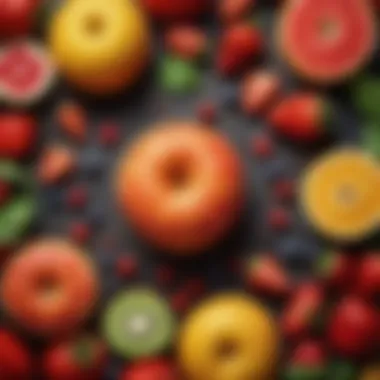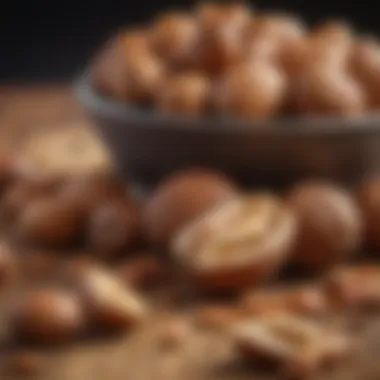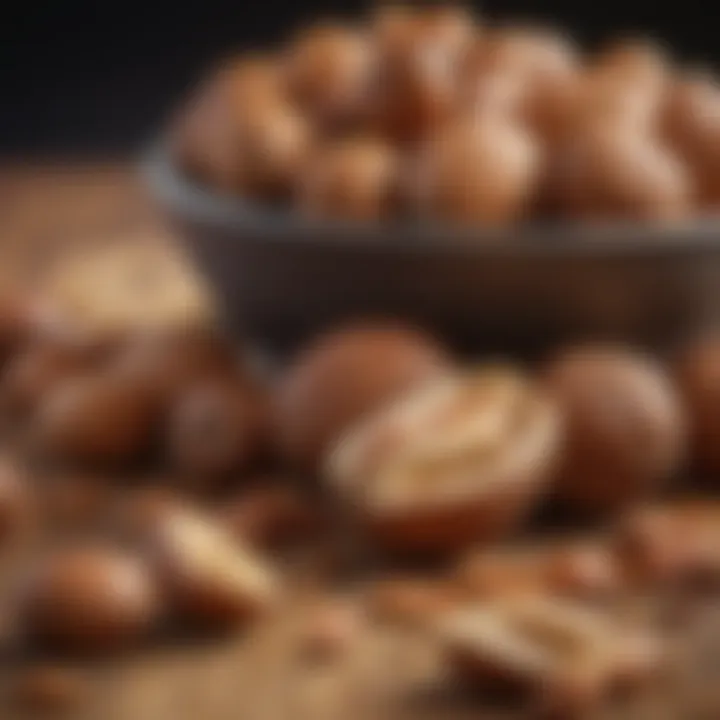Nourishing Your Hair with Healthy Foods


Intro
Maintaining healthy hair is often associated with external treatments, but it is essential to recognize that internal factors play a significant role too. Nutrition, specifically, can greatly influence the health of your hair. A balanced diet rich in essential nutrients promotes scalp health and encourages hair growth. It is no longer just about the products you apply; it is also about what you consume.
This guide explores the relationship between nutrition and hair health, detailing various foods that can contribute to vibrant locks. With insights into the essential nutrients and their food sources, readers can better understand what their bodies need to sustain and enhance their hair. Integrating these nutritional principles into everyday eating habits can lead to not only a physiological change in hair quality but also a delightful culinary journey.
In this context, we will look into the types of nutrients vital for hair health, relevant food choices, and even meal planning strategies aimed at maximizing these benefits. Armed with this knowledge, anyone can work toward achieving healthier hair while indulging in nourishing foods.
Understanding Hair Health
Understanding hair health is crucial for anyone interested in enhancing their appearance. Hair serves as a significant aspect of individual identity, reflecting personal style. It is, however, more than just a cosmetic feature. Healthy hair can symbolize overall well-being. This section will explore the fundamental components of hair, common concerns, and the impact of nutrition on hair vitality. By delving into these areas, one can gain valuable insights into maintaining a lustrous mane.
The Anatomy of Hair
To comprehend hair health, it is essential to know its structure. Hair consists mainly of a protein called keratin. Each strand is composed of three layers:
- Cuticle: The outermost layer that provides shine and protection.
- Cortex: The middle layer that contains pigments for color and determines the hair's strength and elasticity.
- Medulla: The innermost core, which may not be present in every hair.
The hair follicles anchor the hair to the scalp. They are responsible for producing new hair and are influenced by surrounding tissues. Understanding these parts helps determine what nutrients are necessary for maintaining hair's function and appearance.
Common Hair Issues
Despite efforts to maintain its health, hair commonly faces several issues. Some prevalent problems include:
- Hair Loss: Can result from genetics, stress, or medical conditions.
- Dryness: Often caused by environmental factors or lack of moisture.
- Dullness: Can occur due to a lack of essential nutrients or improper care.
- Dandruff: A scalp condition often linked to dryness or irritation.
Recognizing these conditions can help target specific solutions, often starting by enhancing one's diet to support hair health.
Role of Nutrition in Hair Care
Nutrition plays a pivotal role in maintaining healthy hair. The body requires an array of nutrients to support not just hair growth but also its strength and shine. Key nutrients contributing to hair health include proteins, vitamins, and minerals. A balanced diet that incorporates these elements promotes better circulation to hair follicles, which can enhance growth, resilience, and appearance.
Incorporating nutrient-dense foods into daily habits can lead to improved hair quality over time.
"A well-balanced diet rich in vitamins and minerals is essential for not just hair, but overall health."
This foundational understanding allows for exploration into specific nutrients that can enhance hair health.
Key Nutrients for Healthy Hair
To achieve healthy hair, understanding key nutrients is crucial. These nutrients play pivotal roles in promoting hair growth, strength, and vitality. By incorporating a variety of foods rich in these elements, individuals can improve not just the appearance but also the overall health of their hair.
Proteins and Their Importance
Proteins are the building blocks of hair. The hair strand is primarily made of a protein called keratin. Without sufficient protein intake, hair can become weak and brittle. It is essential to include high-quality protein sources in your diet. This can include fish, poultry, dairy, legumes, and nuts. Protein helps in repair and growth of hair, making it a necessary component for those seeking to maintain a fuller head of hair.
Vitamins Essential for Hair Growth
Vitamins are indispensable for hair health. Each type contributes uniquely to hair nourishment.
Vitamin A
Vitamin A is known for its role in cell growth. It helps maintain the natural oil balance of the scalp. This oil prevents dryness, which can lead to hair breakage. Furthermore, Vitamin A aids in the production of sebum, a substance that moisturizes the scalp. Hence, its inclusion in diet is beneficial for maintaining hair integrity.
Vitamin B Complex


B vitamins, particularly Biotin, are vital for hair health. They support the production of red blood cells, which transport oxygen and nutrients to hair follicles. A deficiency in B vitamins can lead to hair loss or poor growth. Therefore, consuming foods such as eggs, nuts, and whole grains can help ensure adequate intake of this essential vitamin group.
Vitamin
Vitamin C serves as an antioxidant that helps combat oxidative stress, known to damage hair. This vitamin is crucial for collagen production, which strengthens hair structure. Additionally, it enhances iron absorption, making it particularly important when considering iron-rich foods. Fruits like oranges and strawberries are excellent sources of Vitamin C.
Vitamin
Vitamin D is often overlooked in discussions about hair health. It plays a significant role in creating new follicles, boosting hair growth. Furthermore, when sunlight exposure is insufficient, one can focus on food sources like fatty fish and fortified dairy products. A balance of Vitamin D can contribute positively to overall hair density.
Vitamin E
Vitamin E aids in maintaining healthy hair by improving blood circulation in the scalp. This increased circulation ensures that hair follicles get enough nutrients for growth. This vitamin is also known for its moisture-retaining properties. Therefore, nuts and green leafy vegetables should be part of a diet aimed at nourishing hair.
Minerals That Support Hair Strength
Minerals are another essential component of a hair-healthy diet. They help strengthen hair and prevent various issues.
Zinc
Zinc plays a crucial role in tissue growth and repair, including hair tissues. It also helps keep the oil glands around the follicles functioning properly. Foods rich in zinc, such as oysters and pumpkin seeds, can help prevent hair loss associated with deficiency.
Iron
Iron is vital for carrying oxygen in the blood. A lack of iron can lead to hair fall because insufficient oxygen reaches hair follicles. Incorporating iron-rich foods like red meat, spinach, and lentils is essential to support hair vitality.
Selenium
Selenium has antioxidant properties that can protect hair from damage. This mineral can enhance the function of enzymes that protect the scalp. Brazil nuts are a notable source of selenium and should be included in dietary practices for better hair health.
Magnesium
Magnesium contributes to many biochemical reactions in the body, including those related to hair growth. This mineral helps promote better hair health by preventing calcium build-up around hair follicles. Leafy greens and whole grains can help meet your magnesium requirements.
In summary, a well-balanced diet enriched with these key nutrients is fundamental in promoting healthy hair. It is necessary to be aware of both what to include and how to integrate these with everyday meals for optimal hair care.
Foods That Nourish Your Hair
In understanding the connection between nutrition and hair health, it becomes clear that the foods we eat have a pivotal role in determining the condition of our hair. Adequate nourishment leads to stronger, shinier, and healthier hair. A well-balanced diet contributes not only to the health of our strands but also to the scalp, as it provides essential nutrients that promote growth and wellbeing. Integrating specific foods into your daily meals can be a practical approach to enhancing the beauty of your hair.
Animal-Based Sources
Fish
Fish, particularly fatty varieties like salmon and mackerel, are noted for their high levels of omega-3 fatty acids. These healthy fats are crucial for maintaining scalp health, reducing inflammation, and promoting hair growth. Omega-3s also support the production of natural oils in the scalp, which can help keep hair moisturized. When including fish in your diet, it is advisable to choose wild-caught options when possible, as they typically have higher concentrations of beneficial nutrients compared to farmed varieties.
Meat
Meat is another important source of protein—a crucial element for hair structure. Proteins are made up of amino acids, some of which are responsible for hair formation. Chicken and lean beef provide not only protein but also vital minerals like iron, which is important for blood circulation to the scalp. However, it is wise to moderate processed meats, as they may present health risks. Opting for lean cuts can ensure that you reap the benefits without unwanted additives.
Dairy Products
Dairy products such as yogurt, cheese, and milk are rich in protein, calcium, and vitamin D. These nutrients contribute to hair strength and growth. The probiotics present in yogurt may also aid scalp health by promoting a balanced microbiome. That said, some people may experience sensitivities to dairy, so it is essential to pay attention to personal health responses when consuming these foods.
Plant-Based Sources


Nuts and Seeds
Nuts and seeds are excellent sources of healthy fats, protein, and various minerals that support hair health. For instance, walnuts provide omega-3 fatty acids and biotin, which is essential for hair growth. Seeds like flaxseeds and chia seeds are also rich in omega-3s and can easily be added to meals or snacks. Care should be taken with portion sizes, as their high caloric content may lead to excessive caloric intake if not moderated.
Leafy Greens
Leafy greens, such as spinach and kale, are abundant in vitamins A, C, and K, as well as iron and calcium. These nutrients are vital for maintaining a healthy scalp and promoting hair growth. The iron found in leafy greens aids in oxygen transportation throughout the body, which is crucial for hair follicle health. Including a variety of greens in your diet can bolster overall nutrient intake.
Legumes and Beans
Legumes, including lentils, chickpeas, and kidney beans, are rich in protein, iron, and biotin—components that are fundamental to hair growth. The fiber content in these foods promotes overall digestion, ensuring that your body can efficiently absorb nutrients. It is beneficial to include different types of legumes in meals as they also provide essential amino acids.
Whole Grains
Whole grains, such as quinoa, brown rice, and oats, provide essential nutrients including B vitamins, iron, and zinc. These nutrients play important roles in hair health by supporting growth and structure. Furthermore, the fiber in whole grains assists in maintaining steady energy levels and promoting a healthy metabolic rate, which can indirectly affect hair quality.
Fruits and Vegetables Beneficial for Hair
Berries
Berries, including strawberries and blueberries, are rich in antioxidants and vitamin C. These compounds protect hair follicles from damage by harmful free radicals and help in collagen production, a vital protein that keeps hair strong. Regularly consuming berries can also enhance scalp circulation, leading to improved hair vitality.
Avocado
Avocado is an excellent source of healthy monounsaturated fats and vitamin E. Its key characteristic is its ability to nourish the scalp, aiding in moisture retention. The vitamin E content promotes circulation in the scalp, which is beneficial for hair growth. Although avocados are seen as highly nutritious, one should be mindful of portion sizes due to their caloric density.
Sweet Potatoes
Sweet potatoes are rich in beta-carotene, which the body converts into vitamin A. This vitamin is crucial for cell growth, including those that contribute to hair follicles. Consuming sweet potatoes can lead to a healthier scalp and promote shine. While they are highly beneficial, one should remember that too much vitamin A can lead to toxicity, so balance is key.
Bell Peppers
Bell peppers, particularly red and yellow varieties, are packed with vitamins A and C. These vitamins enhance collagen production, supporting hair structure. Bell peppers also contain antioxidants that can help reduce hair loss. Adding bell peppers to salads or stir-fries can provide versatility in meals while boosting hair health.
Meal Planning for Hair Health
Meal planning for hair health refers to the strategic selection of foods that enhance the condition and appearance of hair through proper nutrition. It is an important aspect of maintaining not just hair vitality, but overall well-being. A well-structured diet can deliver essential nutrients required for strong, healthy hair. By focusing on specific food sources that nurture hair from within, individuals can witness improvements in shine, strength, and growth over time.
One key benefit of meal planning is that it ensures the consistent intake of vital nutrients which might be lacking in typical diets. It also allows for thoughtful combinations of foods that complement each other's nutritional profiles. Additionally, good meal planning can facilitate healthier eating habits by reducing reliance on processed foods, and encouraging the consumption of whole, nutrient-dense options. Planning meals in advance can save time and make it easier to adhere to healthy choices.
Creating a Balanced Diet
Creating a balanced diet involves incorporating a variety of foods that provide essential nutrients for hair health. This includes proteins, vitamins, and minerals, all of which play a significant role in maintaining hair strength and promoting growth. A balanced diet is not just good for hair, but it also supports overall body function.
To achieve this balance, it is crucial to include:
- Protein-rich foods: Lean meats, beans, and legumes.
- Fruits and vegetables: These provide vitamins and antioxidants.
- Healthy fats: Such as those found in avocados and nuts.
Sample Meal Ideas for Strong Hair
Breakfast Options
Breakfast is often considered the most important meal of the day. Having a solid breakfast can kickstart metabolism and provide energy for the day. For hair health, options like oatmeal topped with nuts and berries can provide a good mix of vitamins and minerals. The oats offer fiber, while nuts and berries add healthy fats and antioxidants. This combination helps not only in improving hair vitality but also supports overall health. However, one must be careful with portion sizes, as too many added sugars or unhealthy fats can negate benefits.
Lunch Recipes


Lunch is an opportunity to refuel. A balanced lunch that incorporates leafy greens, lean protein, and healthy fats is beneficial. Salads topped with grilled chicken or chickpeas and drizzled with olive oil are optimal for hair nourishment. These ingredients work together, providing necessary protein and healthy fats. Yet, if one relies solely on pre-packaged dressings, it may add unwanted calories and sugars, which can lead to adverse effects.
Dinner Suggestions
Dinner can be another chance to pack in nutrients. Grilled salmon with quinoa and roasted vegetables stands out as an excellent option. Salmon is rich in omega-3 fatty acids, which contribute to scalp health, while quinoa provides protein and fiber. However, cooking methods should be considered. Frying salmon may lead to excessive fat, losing some benefits, so baked or grilled is preferable.
Snacks for Nutritional Boost
Snacks are often overlooked in meal planning, but they can be an excellent way to boost nutrient intake between meals. Nuts, yogurt, or sliced vegetables can serve as great snack options. They are not only convenient but can also provide a significant amount of vitamins and minerals. For instance, a handful of walnuts can offer omega-3s and zinc, which are essential for hair growth. One must avoid overly processed snacks, as they often contain preservatives and unhealthy fats that may harm hair health in the long run.
"Nutrition plays a significant role in hair health. A well-planned diet can lead to stronger, shinier hair over time."
In summary, meal planning for hair health offers a comprehensive approach to nourishing hair through diet. By taking a moment to design meals thoughtfully, one can transform their eating habits and, in turn, their hair health.
Lifestyle Factors Impacting Hair Health
To achieve and maintain healthy hair, one must recognize the significant role that lifestyle factors play. Hair health goes beyond mere topical treatments and diet; it is influenced by daily habits and choices. Understanding these elements can lead to improved scalp condition and hair quality. The three main lifestyle factors affecting hair health include hydration, stress management, and proper hair care practices.
Hydration and Its Effects
Hydration is fundamental for overall health and plays a crucial role in maintaining optimal hair condition. Water is necessary for every cell in the body, including those that contribute to hair growth. When the body is dehydrated, hair can become dry and brittle, leading to breakage and a lackluster appearance.
Daily water intake is vital. Aim for at least eight glasses of water each day. However, individual needs may vary based on factors like climate and activity level.
"Proper hydration is essential for nourishing hair from the inside out."
In addition to water, certain foods such as cucumbers, watermelon, and oranges also contribute to hydration. Including these in your diet can assist in achieving hydrated skin and hair.
Stress Management Techniques
Stress can adversely impact hair health by triggering conditions like telogen effluvium, which leads to increased hair shedding. Managing stress is therefore essential for maintaining a healthy mane. Techniques like mindfulness, yoga, and breathing exercises can help mitigate stress levels.
Prioritizing sleep is another vital element. Aim for 7-9 hours of quality rest each night. During sleep, your body repairs itself. This process extends to hair follicles, promoting growth and resilience.
Incorporating regular physical activity also enhances mood and reduces stress. Simple actions like walking or engaging in a fitness class can provide significant mental health benefits, reflecting positively on hair health.
Proper Hair Care Practices
Proper hair care practices are indispensable for maintaining the health of your hair. Gentle handling and the right cleaning habits can prevent damage. Here are some guidelines:
- Use a sulfate-free shampoo and conditioner that suits your hair type.
- Limit the use of heat styling tools, as excessive heat can lead to dryness and breakage.
- Avoid tight hairstyles that can stress the hair shaft.
- Trim your hair regularly to maintain its health and remove split ends.
Moreover, using a silk pillowcase can reduce friction during sleep, promoting less breakage and frizz. Incorporate these best practices into your routine to support hair vitality.
By being mindful of hydration, stress management, and proper hair care, you set the stage for healthy hair growth. Each element contributes positively, resulting in stronger, shinier, and more vibrant hair.
Closure
Understanding how nutrition impacts hair health is a significant takeaway from this guide. Nourishing your hair through proper dietary choices is not merely a trend; it’s a vital commitment to overall wellness. A consistent intake of key nutrients fosters strong, shiny hair while supporting scalp vitality.
Integrating Nutrition into Daily Life
Incorporating these nutritional insights into your daily routine is key to achieving long-lasting benefits. Small, manageable changes to your diet can create a significant impact. Start by replacing less healthy snack options with nutrient-dense foods such as nuts, fruits, and vegetables. Keep your pantry stocked with foods rich in essential vitamins and minerals.
To maintain balance, prioritize a mix of animal and plant-based dietary sources. Consider preparing a weekly meal plan that includes fish, leafy greens, and whole grains. Incorporating high-protein foods into your breakfast can set a positive tone for the day. Simple changes like these can make nutrition feel less daunting and more achievable.
The Long-Term Benefits of a Nutrient-Rich Diet
Embracing a nutrient-rich diet comes with numerous advantages that transcend immediate cosmetic results. Over time, good nutrition can enhance hair strength, promote growth, and reduce hair loss. Nutrients like zinc, omega-3 fatty acids, and antioxidants contribute to maintaining healthy hair follicles.
Moreover, a well-rounded diet supports body functions that indirectly affect hair health. For example, proper hydration and a balanced intake of essential fats contribute to scalp moisture and reduce brittleness. By balancing the diet, individuals can enjoy both aesthetic benefits and improved overall health.







